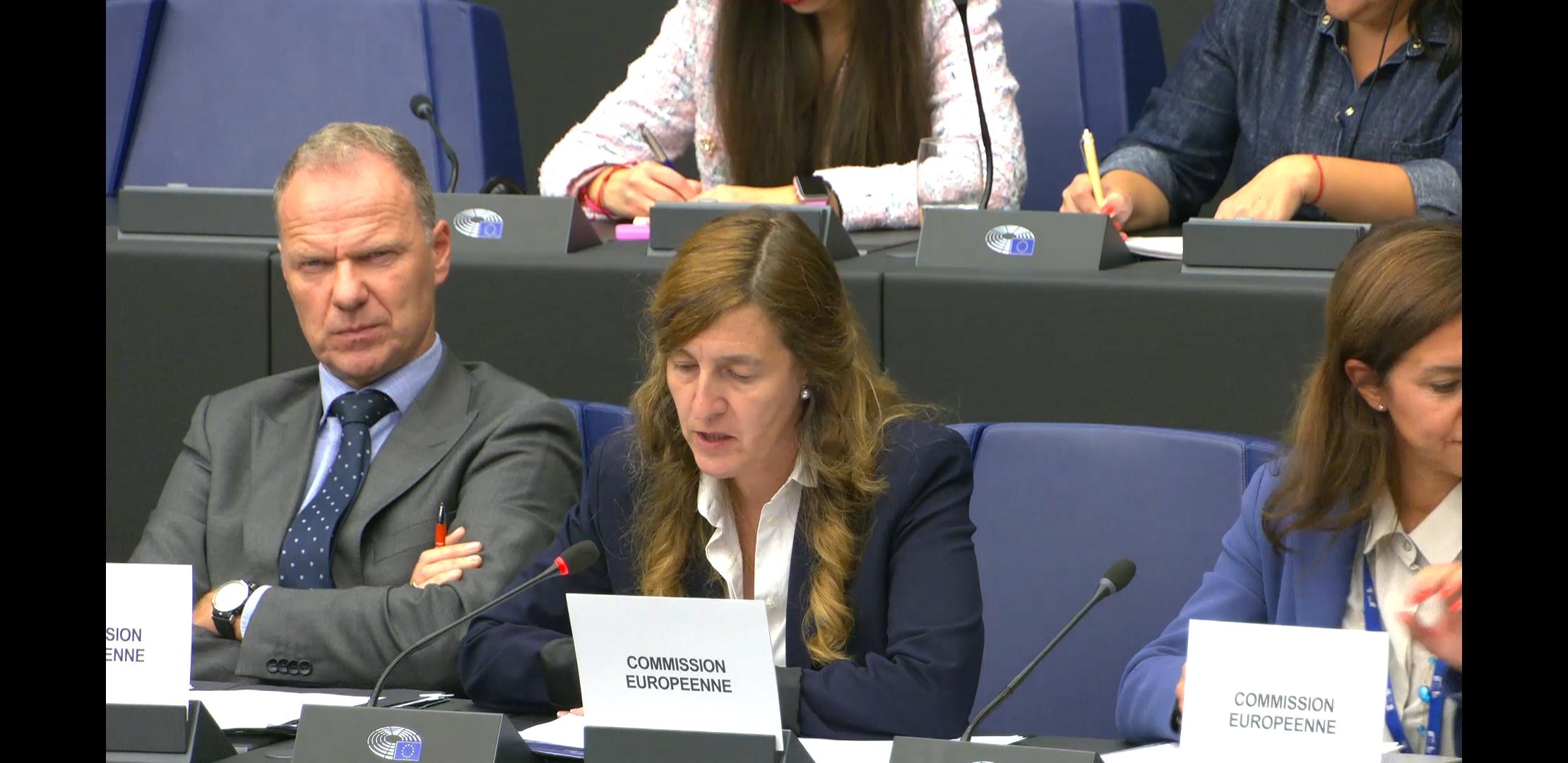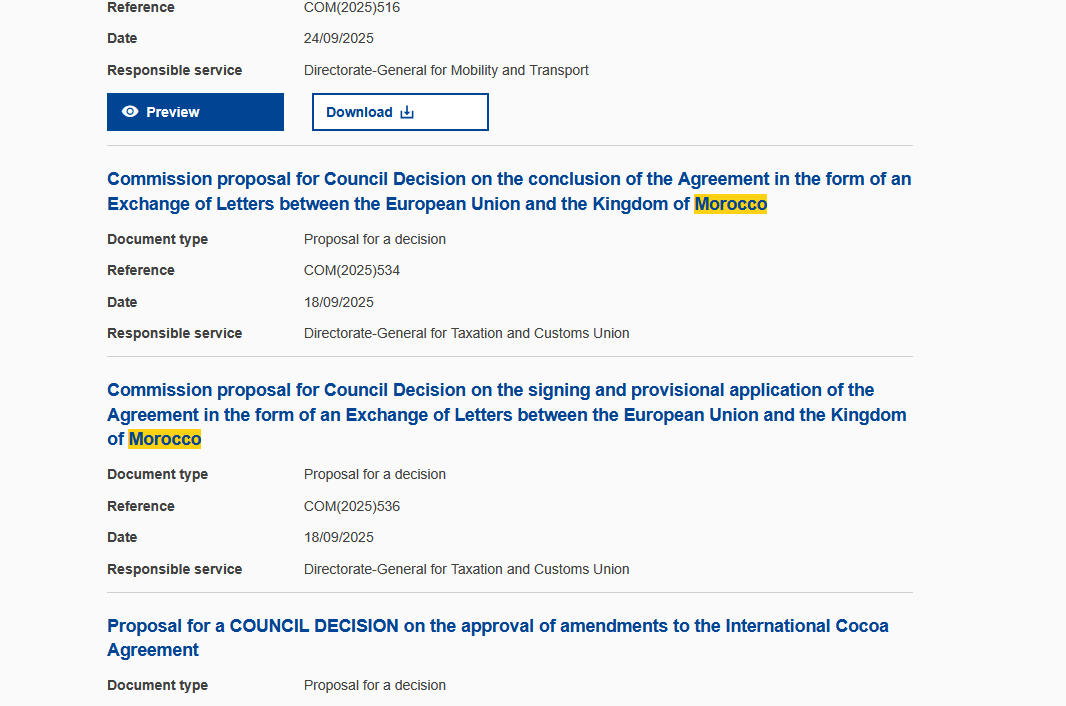
The aspects of international law that was of concern to the European Parliament back in 2011 have not been answered to in the new proposed fisheries agreement, state 21 jurists.
The EU-Morocco Fisheries Partnership Agreement that is up for vote on 10 December "still does not address the failure to conform with international law that was one of the reasons that the European Parliament rejected the Protocol in 2011." This is stated by a group of 21 jurists from Spain, Sweden, United States, Honkong, Luxembourg, Denmark, Canada, Finland, dated 2 December 2013.
The group states that the agreement "may make the EU and its member states liable for a violation of international law, namely recognition of and assistance to serious breaches of international law by Morocco, amounting to aggression and denial of the right of self-determination, including the right to freely dispose of their natural wealth and resources."
Download the legal opinion here.
The conclusion of the document reads the following:
The conclusion is that the 2013 Protocol still does not address the failure to conform with international law that was one of the reasons that the European Parliament rejected the Protocol in 2011.
In the 2013 legal opinion to the European Parliament, the Parliament’s legal service cited its own previous opinion of 2009. The legal service here found that "compliance with international law requires that economic activities related to the natural resources of a Non-Self-Governing Territory are carried out for the benefits of the people of such Territory, and in accordance with their wishes." Further, "[i]n the event that it could not be demonstrated that the FPA was implemented in conformity with the principles of international law concerning the rights of the Saharawi people over their natural resources, principles which the Community is bound to respect, the Community should refrain from allowing vessels to fish in the waters off Western Sahara by requesting fisheries licences only for fishing zones that are situated in the waters off Morocco”. Since there are no records of this having been the case, before or after 2009, Parliament should reject this Protocol and let it be known to the Commission that it expects the Commission to negotiate a new agreement which fully respects international law.
The opinion is signed by the following:
- Oscar Abalde Cantero, Professor of Public International Law, Universidad del País Vasco
- Lennart Aspegren, Former UN Judge
- Nathaniel Berman, Rahel Varnhagen Professor of International Affairs, Law, and Modern Culture, Brown University
- Maria Dolores Bollo Arocena, Professor of Public International Law, Universidad del País Vasco
- Ove Bring, Professor Emeritus in International Law, Stockholm University & Swedish National Defence College
- Candelaria Carrera Asturiano, Miembro de AIODH (Asociación Internacional para la Observación de los Derechos Humanos), Abogados de Badajoz Law School
- Tony Carty, Sir Y K Pao Chair in Public Law, Hongkong University
- Ola Engdahl, Associate Professor of International Law Swedish National Defence College
- David Fisher, Professor of International Law, Faculty of Law, Stockholm University
- Andres Marin Garcia, Miembro de AIODH, Abogados de Badajoz Law School
- Matthew Happold, Professor of Public International Law, Université du Luxembourg 4
- Frederik Harhoff, Professor of International Law, Syddansk Universitet i Odense
- Iñigo Iruretagoiena Agirrezabalaga, Professor of Public International Law, Universidad del País Vasco
- Francisco Javier Quel Lopez, Professor of Public International Law, Universidad del País Vasco
- Mark Klamberg, LL.D. and senior lecturer in Public International Law at Uppsala University
- David Langlet, Associate Professor, Stockholm University, Stockholm Centre Oxford Fellow, Faculty of Law, University of Oxford
- Nicolás Alonso Moreda, Professor of Public International Law, Universidad del País Vasco
- Frédéric Mégret PhD, Associate Professor at the Faculty of Law, McGill University, and the holder of the Canada Research Chair in the Law of Human Rights and Legal Pluralism.
- Jarna Petman, Senior Lecturer/Professor a.i. in International Law, Helsinki University
- Juan Soroeta Liceras, Professor of Public International Law, Universidad del País Vasco and President of AIODH
- Pål Wrange, Professor of Public International Law at Stockholm University
Global Diligence defends operations on occupied land
The legal advisory firm Global Diligence, which presents itself as expert on ‘heightened due diligence’, misrepresents international law in occupied Western Sahara.
MEPs shocked by Commission's Western Sahara bypass
In a hearing at the European Parliament earlier this week, lawmakers expressed outrage at how the Commission sidestepped them to push through a new agreement covering occupied Western Sahara, in violation of EU Court rulings.
EU pushes secretive Morocco trade deal covering Western Sahara
As EU ambassadors give their green light to a new Morocco trade deal, the public is still denied access to the very agreement they are voting on - a striking case of secrecy in Brussels.
"A declaration of war" - new EU agreement reactions
A wave of reactions is rippling across Europe following the news that the EU is moving ahead with a new trade agreement in occupied Western Sahara. The vote is scheduled for tomorrow.



